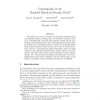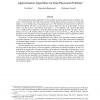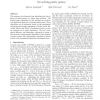161
click to vote
SIAMCOMP
2008
15 years 15 days ago
2008
Abstract. To cope with the impossibility of solving agreement problems in asynchronous systems made up of n processes and prone to t process crashes, system designers tailor their ...
103
click to vote
SIAMCOMP
2008
15 years 15 days ago
2008
We investigate structural properties of interactive perfect zero-knowledge (PZK) proofs. Specifically, we look into the closure properties of PZK languages under monotone boolean ...
118
click to vote
SIAMCOMP
2008
15 years 15 days ago
2008
We initiate the study of two-party cryptographic primitives with unconditional security, assuming that the adversary's quantum memory is of bounded size. We show that oblivio...
SIAMCOMP
2008
15 years 1 months ago
2008
SIAMCOMP
2008
15 years 1 months ago
2008
One of the main goals in the analysis of microarray data is to identify groups of genes and groups of experimental conditions (including environments, individuals, and tissues) tha...
101
click to vote
SIAMCOMP
2008
15 years 1 months ago
2008
We study two pattern matching problems that are motivated by applications in computational biology. In the Closest Substring problem k strings s1, . . ., sk are given, and the tas...
114
click to vote
SIAMCOMP
2008
15 years 1 months ago
2008
We prove semi-logarithmic inapproximability for a maximization problem called unique coverage: given a collection of sets, find a subcollection that maximizes the number of elemen...
131
click to vote
SIAMCOMP
2008
15 years 1 months ago
2008
We develop approximation algorithms for the problem of placing replicated data in arbitrary networks, where the nodes may both issue requests for data objects and have capacity fo...
121
click to vote
SIAMCOMP
2008
15 years 1 months ago
2008
The existence of polynomial time algorithms for the solution of parity games is a major open problem. The fastest known algorithms for the problem are randomized algorithms that r...



